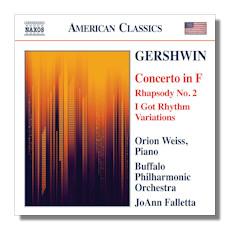
The Internet's Premier Classical Music Source
Related Links
- Gershwin Reviews
- Latest Reviews
- More Reviews
-
By Composer
-
Collections
DVD & Blu-ray
Books
Concert Reviews
Articles/Interviews
Software
Audio
Search Amazon
Recommended Links
Site News
 CD Review
CD Review
George Gershwin

- Piano Concerto in F (1925)
- Rhapsody #2 for Piano & Orchestra (1931)
- "I Got Rhythm" Variations (1934)
Orion Weiss, piano
Buffalo Philharmonic Orchestra/JoAnn Falletta
Naxos American Classics 8.559705 58:39
Also available on Blu-ray NBD0025:
Amazon
- UK
- Germany
- Canada
- France
- Japan
- ArkivMusic
- JPC
George Gershwin is one of those composers who gets the Rodney Dangerfield treatment; "No respect, no respect at all". The truth is that his "serious" music is as tuneful and appealing as it was the day the man wrote it. If he was arguably uncomfortable in large forms and preferred to write songs that people still love to sing, that technically puts him in the same company with Robert Schumann. Go figure.
Both of Classical Net's entries for the Concerto in F (there is a third, an arrangement sans orchestra) were recorded prior to 1970. Over 40 years later, this disc from 2012 certainly makes a serious case for this music. Firstly, Orion Weiss is a fabulous pianist, both here and on Naxos 8.559750, released the following year. He gives the Concerto its most serious reading I've heard to date. No, the jazz elements aren't shortchanged, they are here in abundance. Rather, the approach is a unique one. Tempos are slower than on other albums. JoAnn Falletta and Weiss wisely use the extra time to sharpen the rhythmic profile of the work, and also allow for a wealth of detail to be exposed. This makes the whole concerto feel more relaxed and sincere as a whole. Rather than simply feeling like this is a jazz piece masquerading as a concert work, the situation appears reversed. Thus we have a genuine concert piece with jazz elements. The Buffalo Philharmonic lavishes immense care on the score, adding to the sense of renewal and discovery. JoAnn Falletta is a terrific conductor of American music as well, and she collaborates effortlessly with her soloist. The concluding Allegro con Brio is a case in point. Such is the attention to detail that the whole movement takes on a darker hue. It also comes off as more fluid than usual, thanks to insistence on accuracy and maintaining the music's inner pulse. The end result is satisfying as any.
In the rarely-heard Rhapsody #2, Weiss remains a compelling advocate. This is a work that gets a bad rap because it's not the Rhapsody in Blue. But a careful listen shows this ugly-stepsister to be something more than that, especially in these hands. It's jazzy, exciting, and really quite beautiful. If it doesn't have that "big tune" that allows you to leave the hall humming, the work is still finely crafted and great fun. And Falletta and her players simply play the daylights out of it, clearly relishing the catchy wind solos and brass outbursts. Weiss brings the same seriousness and commitment to this lesser piece as he did the Concerto, and it pays off big time! Listen to the absolutely romantic warmth of the Buffalo strings, the swagger of the orchestral fanfares, and the pianist's big-hearted dispatching of the solo line. You'll love it, and probably want to sample it again. In the Variations, this team has a blast, and ends the disc on a spectacular high. Superb sound and the low Naxos price seals the deal on a truly inventive Gershwin program.
Copyright © 2014, Brian Wigman




















